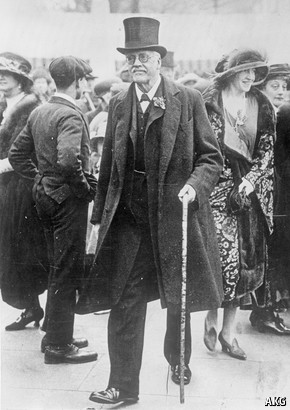
Recognising Palestine
October 21, 2014
John Mauldin’s Thoughts From The Frontline – The Flat Debt Society
October 21, 2014A U.S. Department of Justice official pledged Monday to conduct a thorough, independent and objective review of the city police force after hearing more concerns from residents about excessive force and other misconduct by Baltimore officers.
While some Baltimoreans called for a full-scale civil rights probe of the city police, the head of the Justice Department’s Office of Community Oriented Policing Services said federal officials believe working with the department is the best way to improve its interactions with the community.
Ronald L. Davis, the director of the Office of Community Oriented Policing Services, or COPS, said they decided on that approach — called collaborative review —after considering the reforms instituted in last two years by Police Commissioner Anthony W. Batts and Mayor Stephanie Rawlings-Blake.
“The civil rights division is a part of the process,” Davis said, “and they retain the ability to come into Baltimore if reform is not made, if recommendations are not implemented. … Nothing is off the table.”
Rawlings-Blake and Batts asked the Justice Department to examine the department this month.
The request came days after The Baltimore Sun reported that the city had paid $5.7 million in court judgments and settlements in 102 civil suits alleging police misconduct since 2011. Nearly all of the people involved in the incidents that led to the lawsuits were cleared of criminal charges. Some officers were named in more than one lawsuit.
Davis detailed the plans to work with city leaders and outside consultants in the next 30 months to curb future abuses by police officers.
Policing consultants, working with federal officials, plan to start interviewing community members, elected leaders, officers and union officials within weeks. They plan to ride with officers and examine the culture, practices, policies, supervision and oversight in the department.
Davis said federal officials would be “very blunt” in identifying deficiencies and holding officials accountable to rebuild the trust with residents.
“This is very strong process,” he said during a news conference at the U.S. attorney’s office in Baltimore. “I want to reassure the community this is about helping the city of Baltimore reform. This is not about forcing them to reform in a way that we decided.”
The Justice Department plans to hold community meetings so residents can discuss problems they have seen with the police. Officials plan to issue an assessment and recommendations, and provide two updates in the 18 months after the review is finished.
Batts and Rawlings-Blake say they approached the Justice Department about reviewing the department months before The Sun published its report.
Mark Puente City police commissioner has known head of federal agency for years City police commissioner has known head of federal agency for years ( Mark Puente ) –>
The report recounted the broken bones and battered faces suffered by suspects during arrests, and found that officers didn’t always complete the use-of-force reports that are required after violent arrests.
Some suspects said they didn’t pursue complaints against officers after they were treated harshly by the department’s internal affairs detectives.
The consultants plan to review disciplinary records and files from review boards, and sift through residents’ complaints to match them to lawsuits in which officers were accused of abuse.
“Accountability means you have a system that would be very thorough evaluation of any use of force through the chain of command,” Davis said. “If the reports are not there, but you have lawsuits, that suggests other challenges or problems.”
One of the many goals is to determine whether the use of force was constitutional.
The Justice Department plans to share its findings with nearly every law enforcement agency in the country, with the goal of improving policing nationwide.
The Department of Justice developed the collaborative review process in 2011.
The process includes an examination of training standards, the way officers interact with residents and how the department tracks complaints.
The first review, of the Las Vegas Metropolitan Police Department, included interviews with more than 100 people, including residents, officers, prosecutors and police union officials. The Justice Department finished its review in November 2012 and issued a 155-page report in May, with 75 findings.
The department is conducting similar reviews in Philadelphia and Spokane, Wash. Davis said he would be in North Carolina on Tuesday to announce another review.
Yvonne Wenger Mayor Stephanie Rawlings-Blake plans to announce a working group on Friday to study the cost and privacy concerns that would be associated with equipping Baltimore police officers with body cameras that would film their interactions with the public. Mayor Stephanie Rawlings-Blake plans to announce a working group on Friday to study the cost and privacy concerns that would be associated with equipping Baltimore police officers with body cameras that would film their interactions with the public. ( Yvonne Wenger ) –>
U.S. Attorney Rod J. Rosenstein, who joined the officials for the announcement, commended Rawlings-Blake and Batts for seeking federal help. He also applauded officers who strive to make the city safer.
“Every problem that comes to light masks the fact that so many positive things are being done by the Baltimore City police on a daily basis,” he said.
Rawlings-Blake told reporters she would eliminate bad officers from the force and regain the trust of residents.
“Baltimore can only become a safer city if the community and police are working hand-in-hand to rid our streets of violence,” she said. “We have to work every day to bring more transparency and more accountability to policing in Baltimore.”
Batts vowed to bring “dramatic change” to the department and to make it one of the best in the country.
“That has been my goal since I stepped into this position two years ago,” Batts said.
Batts and Davis were asked about the ties they developed while serving as police chiefs in California. Batts was chief in Oakland and Long Beach; Davis rose to captain in the Oakland Police Department before serving as chief in East Palo Alto.
Batts said his leadership roles in a national police association put him in contact with chiefs across the country. Davis said his federal job puts him in contact with the same chiefs.
After the 30-minute news conference, officials met behind closed doors for about 90 minutes with community members selected by the mayor’s office.
“I think it was a good start,” Mark Washington, executive director of Coldstream Homestead Montebello Community Corp., said after the meeting.
Robert Hunt with the Alliance of Rosemont Community Organizations said he would have preferred a civil rights investigation to a collaborative review. Still, he said, something needs to be done to reform the police force.
“If the mayor and police commissioner buy into it, then it will work,” Hunt said.
Davis called the meeting “very productive.” He said community members discussed concerns about the lack of trust with the police and the negative ways some officers interact with residents.

